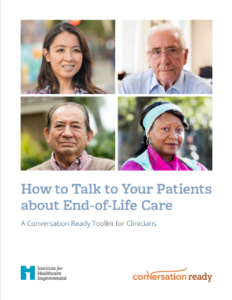A Toolkit and a Framework for Action
We are so excited to share these two new documents with you, geared for health care professionals or anyone interested in helping to ensure wishes for end-of-life care are expressed AND respected. Both can be accessed for free via links below.
How to Talk to Your Patients about End-of-Life Care: A Conversation Ready Toolkit for Clinicians 
This new toolkit is intended to help clinicians address some of the challenges of engaging with patients and families in end-of-life care conversations over time. The four cases present patients with diverse backgrounds and experiences at different points of illness, as well as diverse clinicians and care settings. Each case describes the progression of the patient’s illness and outlines key considerations for clinicians to engage the patient and family in discussions about what matters most to the patient at the end of life.
The above toolkit serves as a companion piece to our recently released Conversation Ready White Paper:
“Conversation Ready”: A Framework for Improving End-of-Life Care (Second Edition)
This white paper presents IHI’s “Conversation Ready” approach to help health care organizations and clinicians provide respectful end-of-life care that is concordant with patients’ stated goals, values, and preferences. The framework is relevant whether you are a leader in a large hospital, a social worker in the community, a doctor in a clinic, or a palliative care nurse in a skilled nursing facility. The second edition is an update of the original 2015 white paper, based on additional learning from several years of work with dozens of diverse health care organizations and hundreds of health care professionals.
For more details on the Conversation Ready framework, check out the recording and slide deck from our April 2019 community call. On this call, we explored how healthcare providers can create a culture where their patients are not only sharing their end-of-life wishes but providers are also well equipped to receive and engage in these discussions.
Needing Motivation?
In addition to the above tools, we are humbled to share two personal stories demonstrating that providers’ experiences can shape their call to action, reminding us why this work is so important.
Having the Conversation I Encourage Others to Have
In this powerful JAMA article, Kate Lally, MD shares her experience of grappling with her cancer diagnosis and how her personal journey has informed the ways in which she engages her patients in end-of-life discussions. This gripping piece eloquently captures the significance of providers having the conversation with their loved ones before they have the conversation with their patients.
When Wishes Are Not Respected at the End of Life (Video)
In this footage captured and produced by Beaumont Health in Michigan, David Wood, MD, the Chief Medical Officer at Beaumont, describes the  challenging experience he faced as the surrogate decision maker for his father at the end of life. His story is a reminder of the significant role providers play in ensuring that their patient’s end-of-life wishes are honored and what can happen when they’re disregarded.
challenging experience he faced as the surrogate decision maker for his father at the end of life. His story is a reminder of the significant role providers play in ensuring that their patient’s end-of-life wishes are honored and what can happen when they’re disregarded.
Skill Building Opportunities
And, last but not least, we want to ensure you know about the below resources that have helped countless health care professionals on their journey to ensure everyone’s wishes for end-of life care are expressed AND respected.
FREE Online Course: Basic Skills for Conversations about End-of-Life Care:
In collaboration with the IHI Open School and Boston University School of Medicine, The Conversation Project offers this free course to help develop skills to have conversations with patients and their families about their preferences for care at the end of life.
Virtual Expedition–Conversation Ready: Understanding and Respecting Patients’ End-of-Life Wishes
Becoming Conversation Ready is an effort is to provide more patient-centered care in order for patients to gain an understanding of what matters most to them when it comes to end-of-life care planning. Structured around the aims of The Conversation Project, this virtual training teaches the five principles of being Conversation Ready.
Modules from Stanford School of Medicine for health care providers to raise awareness of specific cultural, racial, and ethnic influences on health and health care of older people from specific ethnic backgrounds.
Additional health care tools and resources can be found on our Health Care Resources page. You can also stay up to date about our latest resources, news and events by signing up for our monthly newsletter here!
What other resources have helped you on your journey to ensure wishes are respected? Share with us below!


I am trying to access “How to talk with your patients about end-of-life care” – but have been unable to register. Actually thought I am already registered because I get TCP email notices, etc – but the website is not letting me create a new password OR register as a new account.
Help, please!
Joan Lane
Southwest Community Health Center, Bridgeport, CT
Hi Joan, please email your tech concern to mpanwar@IHI.org. They should be able to help you figure out how to access the Kit.
I learned the hard way that the IHI website does NOT work with Chrome. Try it with Safari. Good luck,
Hi Jasen, if you continue to have issues accessing the IHI website, please email your tech concern to mpanwar@IHI.org. They should be able to help you.